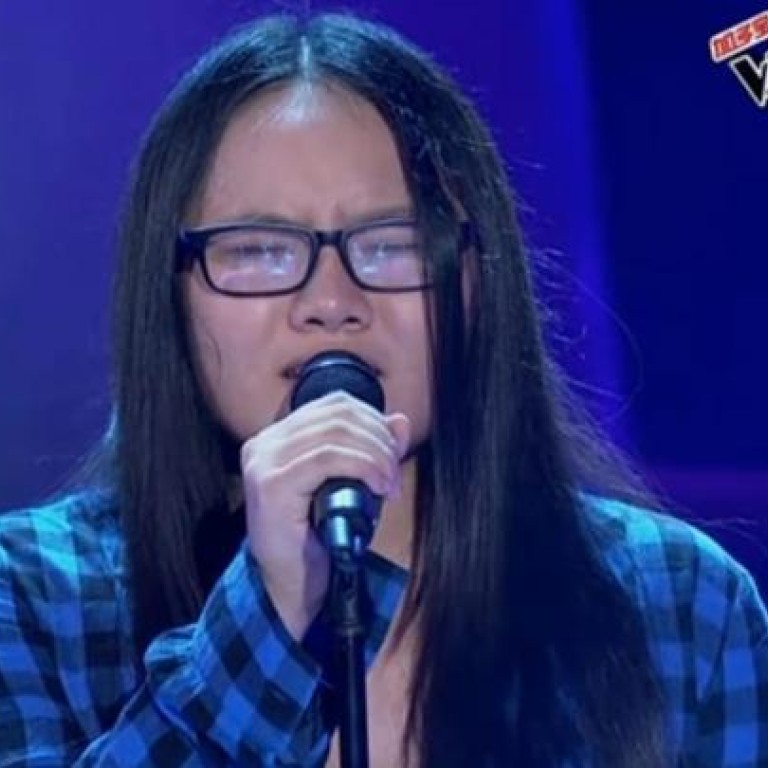
The Voice of China reality television show attracts more than 120 million viewers
The Voice of China is topping the TV ratings on the mainland and it's appeal lies in the fact that talented but ordinary people are trying to make it big
, an internationally franchised reality television show, has been a big hit on the mainland since its launch last month, with attracting more than 120 million TV viewers and 400 million internet users - and topping the ratings.
Advertising slots on the show now cost 360,000 yuan (HK$439,100) for 15 seconds - adding up to 16 million yuan a week for the one-hour show - and they're getting more expensive each week, showing that the show's producers made the right decision when they paid the Dutch originators of the concept 3.5 million yuan in copyright fees.
What makes it unique is that the talent on the show is selected through blind auditions, where the judges can only hear the singers who are auditioning for slots on the show.
As the judges express interest in the contestants, they turn their chairs around to face them. If more than one judge turns around, the contestant can select which coach they prefer.
Each team of singers is mentored and developed by a coach and the list is whittled down through a series of live performances.
The criteria for the mentors is the same in every country. They are all celebrity artists, often including an influential figure in the music industry, a grass-roots singer, one designed to attract young audiences and one female. The US show featured Christina Aguilera, Cee Lo Green, Blake Shelton and Adam Levin.
chose renowned musician Liu Huan, who sang the Beijing Olympics theme song with Sarah Brightman, pop diva Na Ying, mainland singer Yang Kun and Harlem Yu, a singer-songwriter from Taiwan.
Before , several TV stations produced copycat versions of , the original show. Even a state-run China Central Television station was implicated, with one of its programmes looking very similar.
China has been making knock-off handbags and electronic appliances for years, but, more recently, fingers have been pointed at a different kind of counterfeit product - TV shows. But that approach was rejected by those behind .
"Why did we still pay for the copyright despite the prevalence of pirates? Because we believed there was much to learn and reap from a show that has succeeded across the world," said Lu Wei, the publicity director for Star China Media, which produces . "We can avoid taking the wrong path. I think paying for copyright is very worthwhile."
Besides paying 3.5 million yuan for the copyright, Star China Media has also spent nearly 100 million yuan to remain faithful to the original programme.
"The producer of offered us a 200-page product description to advise us on the show, including things like promotional designs, how to choose mentors and contestants, competition methods and details about the logo's colour and sound effects," Lu said. "Even the swivel chairs were shipped from the Netherlands to China.
"For example, we wanted to have famous record producers as judges. But they insist that all judges should be singers, including a female and a grass-roots singer who has struggled for their dream for years.
"We were doubtful at first. But now Yang Kun, the grass-roots judge, has become the most popular figure in the show. And even the shirt he wears on the show has become a hot sales item online."
However, unlike the shows in Britain and Australia - where the contestants from the final team compete against each other in the finale and the outcome is decided solely by public vote - Lu said there would be no public vote in . Instead, they would invite representatives from different media outlets as judges for the finale in addition to the panel of four.
Public votes for a reality show were banned after - by Hunan Satellite TV - drew more than 400 million viewers who sent in eight million text-message votes for their favourite contestants in the final episode in 2005.
At the end of last year, the State Administration of Radio, Film and Television banned future productions of . While the official reason for the decision was its violation of a rule that says talent shows can run for only 90 minutes an episode, many believe that political sensitivities were really to blame.
But has also built up its own core magic to attract viewers.
In the programme, ordinary people can identify with every contestant. There is the girl whose late father hoped his daughter would follow his musical dream, a 30-year-old man whose musical talent went unrecognised but whose girlfriend never gave up on him, and a country girl who likes to sing Adele's songs in the hills but does not understand English.
All the contestants are extremely good singers but they lack glitz and have endured various hardships in their lives and careers. But it is that lack of glitz that could be the show's best selling point because it touches tens of millions of viewers.
"I like the sense of honesty and respect for music shown by the contestants," one microblogger wrote.
Peggy He, a Guangzhou university student, said she was touched by the contestants and their struggles.
"They are just like you and me and anyone walking on the street," she said. "We all suffer and struggle in daily life but still look for opportunities for a better life.
"It is really a magic moment when one or more than one judge turns their chair. I love the show. It is just so different from other reality shows."
Reality TV shows are more popular than comedies, dramas and documentaries on the mainland, where TV viewers complain that restrictions imposed by the authorities result in boring shows that avoid real issues such as soaring living costs, crime, corruption and the failings of the Communist Party.

